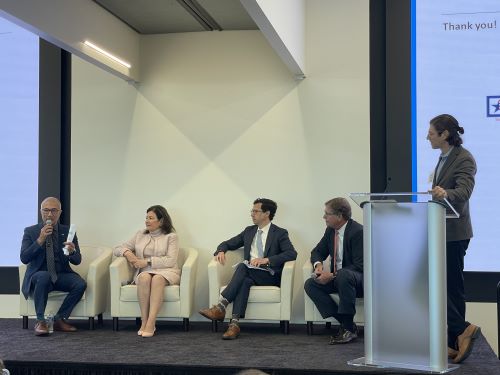Will Immigrants Affect Economic Policy?
 The New York Times has some wonderful Room for Debate pieces debating whether the American electorate is getting more liberal. From Molly Worthen bemoaning the rise of secular libertarianism to Robert Reich repeating the mantra of the New Deal to Kay Hymowitz arguing that Millennials are not so liberal, all are worth reading.
The New York Times has some wonderful Room for Debate pieces debating whether the American electorate is getting more liberal. From Molly Worthen bemoaning the rise of secular libertarianism to Robert Reich repeating the mantra of the New Deal to Kay Hymowitz arguing that Millennials are not so liberal, all are worth reading.
If the U.S. government does adopt more liberal economic policies over the next few decade, immigrants and their descendants will not be to blame. There are four pieces of research that lend support to this view.
First, according to a working paper authored by Zac Gochenour at Western Carolina University and myself, the number of immigrants and their descendants has not affected the size of welfare benefits or spending on the state level from 1970 to 2010. States have the power to set the benefit levels for numerous means-tested welfare programs and also have radically different flows of immigrants into or out of their borders - producing an ideal environment to test how immigrants and growing ethnic diversity affect the size of welfare benefits. Although immigrants don’t shrink the welfare state, they don’t grow it either. For every state like California and New York with many immigrants and a large welfare state, there is a state like Texas or Florida with many immigrants and a small welfare state.
Second, according to an academic paper I co-authored with economists J.R. Clark, Robert Lawson, Benjamin Powell, and Ryan Murphy, increasing levels of immigration in the past predict more economic freedom in the future – both in the United States and internationally. The story is slightly negative when looking at American states but the negative effect there is more than counter-balanced by the positive shift on the national level. Although we can’t say that immigration caused that improvement in policy, we can say that immigration didn’t cause the economy to become less free.
Third, throughout American history the size of the federal government grows most rapidly when immigration is closed off. The federal government grows much more slowly when the borders are more open, prior to 1930 and after 1970, than when they are closed during the 1930 to 1970 period. What happened from 1930 to 1970? Besides immigration being closed off, the New Deal, the Great Society, and a whole panoply of expensive government programs were initiated that were only possible because immigration was closed off. Don’t believe that closing the borders was politically necessary to gain broad public support for those programs? Paul Krugman and Vernon M. Briggs Jr. of the anti-immigration Center for Immigration Studies disagree with you (pg. 81-82).
Fourth, immigrants and their children have political opinions very similar to native-born Americans going back several generations. In order to change public policy, immigrants and their descendants must first have significant differences of opinion with natives over these policies. As Sam Wilson of George Mason University and myself found when we examined the General Social Survey data, immigrants have political and ideological opinions virtually indistinguishable from those of Americans. Where small differences exist, they are entirely gone by the second-generation. If immigrants and their children don’t differ from Americans very much, they won’t change public policy either.
One political party may gain more than another because of immigration but that doesn’t mean that national policy will shift. Policy, not the partisan identity of politicians, is what interests us. American public opinion on economic and other policy matter might change in the near future but that change won’t come from the differing opinions of immigrants or their children - unless something big changes.








